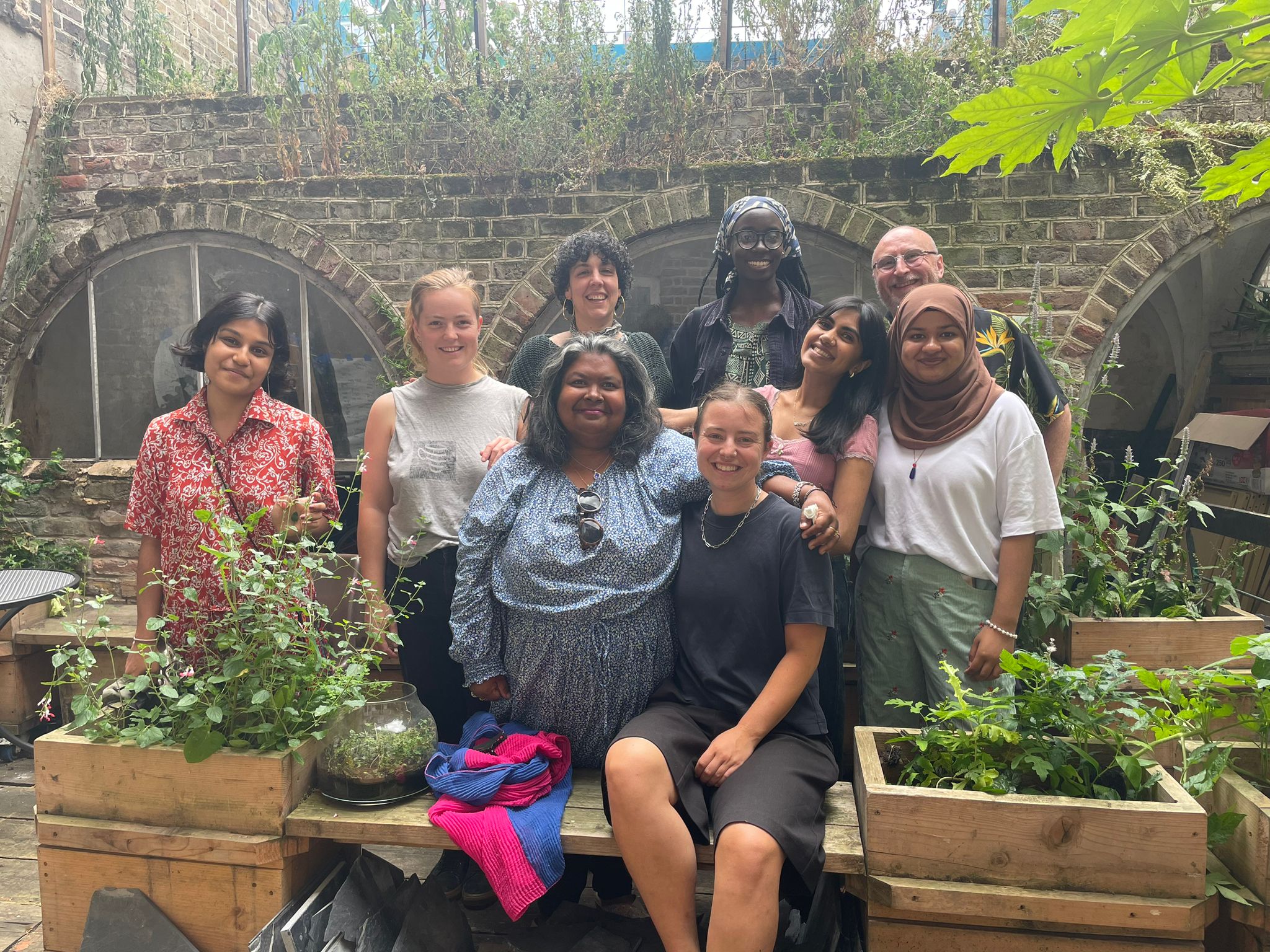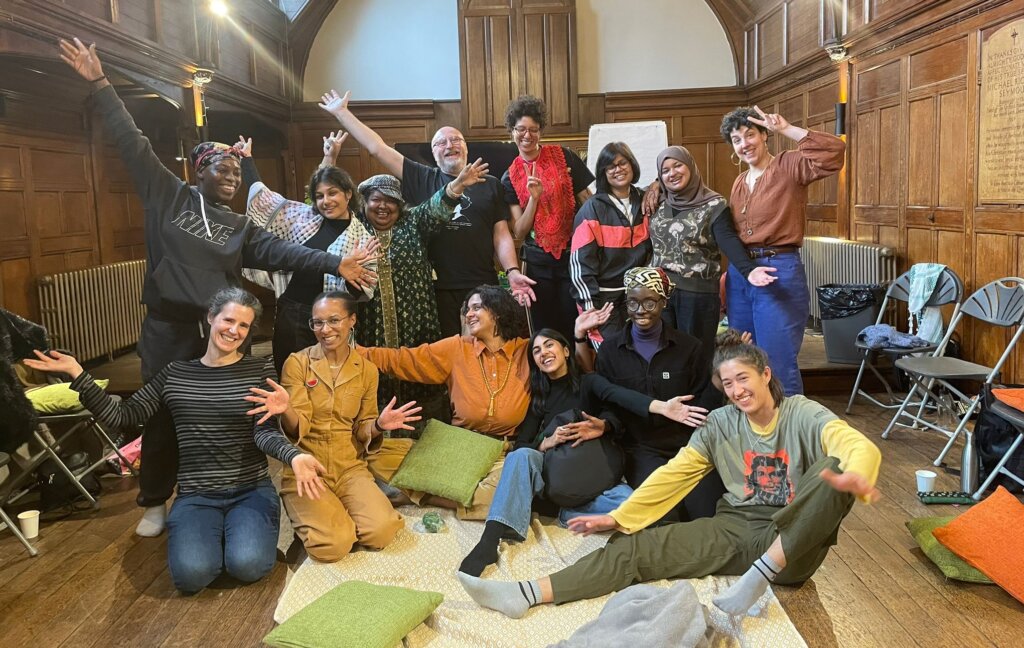
Our Communications Coordinator, Tesni Clare, reflects on what it means to partner and ally with marginalised communities – following several months of working with the Tower Hamlets food justice collective, the Blueprint Architects.
It’s a curious thing, to set out on a path that you don’t yet know the shape of. In the charity sector, we’re used to predetermined project plans with clearly articulated aims, linear timelines, measurable outcomes and tangible outputs. Our work is packaged into neat containers. (In many ways it has to be, as more traditional sources of funding expect this). But by doing this, we might be foreclosing the possibility of really learning from and co-creating with communities. We also risk perpetuating a capitalist, solutionist mindset that has racial injustice at its heart.
‘Capitalist, white culture is based on hierarchical and binary relationships; tasks over connection; and rationality over emotionality,’ writes Elena Blackmore, reflecting on what it means to decolonise narrative and campaign work.
Through an ongoing partnership, we at the Food Ethics Council have been carving out space to instead prioritise connection, reflection, emotionality and meaningful relationship building. Last year, we were approached by Feedback Global, who were funding BPoC fellowship placements between partner organisations as part of an anti-racism programme. We were given the opportunity to partner with food justice collective The Blueprint Architects (who are coordinated by Platform London), with whom we would co-host a BPoC fellow for several months.
Feedback’s anti-racism programme seeks to create structural change in the food and farming sector by building new alliances between environmental and social justice organisations, whilst centering BPoC lived experience, wisdom and leadership. For organisations working to build an equitable, resilient food system, understanding and dismantling the exploitative, colonial and racist foundations of our industrial food system, and learning from those most affected by it, is crucial work.
The Blueprint Architects are based in Tower Hamlets – a borough facing the sharp end of capitalist violence, gentrification, and an inaccessible, profit-driven food system, where over 4,500 households are food insecure. 80% of The Architects are BPoC and a majority either come from a working-class background or are on low incomes, whilst many have histories of migration and families impacted by the legacies of colonialism. Drawing on the resourcefulness, resilience and networks of solidarity within the borough, the collective is growing an alternative, community-led food system rooted in care and reciprocity.

Sumayyah joined as our fellow in December. A Blueprint Architect herself, she’s a community organiser, researcher and Tower Hamlets resident.
Through a few, early conversations, we came up with some broad aims for Sumayyah’s fellowship: to work with Platform London and the Food Ethics Council to support the already very alive work of The Blueprint Architects, share their learnings more widely, as well as explore what forms of allyship, solidarity and accountability could be drawn from new audiences within the Food Ethics Council’s network.
Prioritising relationships
Beyond those broad aims, we were unsure of how the fellowship and partnership would unfold. How could a small, remote think-tank, working within the business and policy sphere with the framework of food ethics, find common ground with a grassroots, community-organising group? What did we have to offer? What would we learn? How would we build trust? How would we measure the success of our collaboration?
After a while, we accepted the unknown. We grew comfortable with a little discomfort. We allowed things to emerge, slowly. Critically, we became less interested in ‘outputs’ and ‘measures of success’ and agreed that our only real priority was to build meaningful relationships – itself a necessarily slow process.
By making relationships our only priority, we have nurtured a sense of trust between all partners that has allowed us to speak meaningfully and honestly with each other. For example, Sumayyah has joined various conversations about our strategy and upcoming project work at the Food Ethics Council, and has shared honest, critical and incredibly valuable reflections – which we have been so grateful for.
In their Racial Equity Toolkit, U.S. Young Farmers Coalition warn about the framework of urgency underpinning environmental, climate and food systems work: ‘A continued sense of urgency is one of the characteristics of white supremacy culture. Working urgently often means not taking the necessary time to be inclusive, make equitable decisions, or consider the long-term impact those decisions can have on people of color, especially when they are not included in them.’
Elena Blackmore reiterates this: ‘We’ve largely been socialised in a capitalist society to understand time as linear, productivity as key, and therefore to see speed and urgency as of the essence …Groups and individuals are often under pressure to produce campaigns and communications in unrealistically tight timescales; never with enough time for the big conversations about vision and the whys, whos and hows, or for meaningful review and evaluation.’
Being responsible for the communications at the Food Ethics Council, I’m guilty of slipping into the mindset that I’m only ‘doing work’ when I’m creating content: posting on social media, writing reports, sending out newsletters. But really, some of the deepest ‘work’ I’ve done this year has been through the fortnightly conversations I’ve held with Sumayyah as part of this fellowship.
I have learnt so much from Sumayyah and – through her – from the community in Tower Hamlets.
Self-determination
From the moment Sumayyah stepped into the role as fellow, she stepped back. Her priority was to listen to what her community needs, and to be led by that insight. I wonder how often, when charities are ‘working with’ affected communities, are we genuinely stepping back and allowing communities to shape or lead the work? How often are communities ‘engaged’ once the parameters of a project have already been defined? This speaks of the way in which knowledge has been hierarchised through colonialism: valorising academic, ‘professional’ knowledge over community wisdom.
However, it is crucial that food, land and environmental justice work is led by communities with lived experience of racialised oppression, hunger, and dispossession. Otherwise, we are only entrenching existing power dynamics and inequalities.
The thing is, the work is already being done. Communities facing food insecurity are continually finding imaginative and liberatory ways of caring for each other, outside of violent capitalist structures. As Sumayyah articulated so beautifully in a recent conversation about the ‘right to food’: ‘We’re already doing the work by not letting our neighbours go hungry.’
This work just needs properly resourcing. This is about redistributing resources from private pockets and wealthy organisations, into thriving community projects that are well-placed to meet local needs. The Blueprint Architects quote Derek Bardowell in their latest report: ‘Imagine if institutional philanthropy was accountable to communities and genuinely willing to sacrifice. Imagine if it understood the joy that leaps through the cracks of oppression or had enough faith in communities to determine their destinies and win.’

Resourcing communities
A central resource at the heart of The Architects’ work is land. Access to land is of course one of the biggest barriers to accessible, nourishing food – a barrier that is significantly higher for BPoC communities. In a recent conversation we held about what a ‘right to food’ could look like in the UK, Sumayyah made the powerful point that communities don’t want to be provided for (for example in the form of emergency food aid), they want access to land so they can provide for themselves.
Throughout this partnership, we at the Food Ethics Council have been reflecting on what a small charity like ours can do to help resource the work of grassroots collectives like The Blueprint Architects. Resources can look like a lot of different things: money, time, skills, knowledge, tools, materials, land, buildings, access to networks.
As we’re a tiny, fully remote charity with no physical assets or spaces, the resources we can offer are our time, skills and networks. Following a few conversations with the team at the Food Ethics Council, we compiled a list of Community Offerings – a simple, one-sided PDF from which we can springboard into deeper collaborations. They include things like: amplifying people’s voices via our channels, blog and access to media platforms; promoting local campaigns more widely; collating and sharing learnings between similar projects and movements; and facilitating conversations or workshops.
We’ve disentangled what feels like a useful, reciprocal synergy between ‘think tank’ style organisations and grassroots communities delivering change on the ground. Those working locally and immediately rarely have the headspace or time to connect their work to the bigger story, to learn from similar yet geographically distant projects, and to build up relations with media or travel to speak at conferences and events. However, remote NGOs, with staff peppered across the UK, are well-placed to do this work of connecting, convening and amplifying.
Care at the centre
Something else that’s shifted since starting this partnership is how we allow each other to show up at meetings. We at the Food Ethics Council have learnt a lot from the way in which The Blueprint Architects and the team at Platform hold space for emotionality and personal reflections during calls. We are now on a journey of also trying to bring our whole selves to meetings, as well as hold space for personal check ins, slowness and reflection whenever we hold spaces. This is something that has been actively discouraged by patriarchal, white, capitalist culture. But working to build an equitable, resilient food system is a necessarily personal, emotional process.
For many people, there can be no clear boundary between what we’re tackling at work and what we’re going through at home; especially for those experiencing food insecurity and living with the everyday oppression of systemic inequity. Food is so embedded within our communities, our cultures, livelihoods and sense of belonging. It’s a thread that weaves its way through our everyday lives – lives that are punctuated with pain, joy, trauma, and growth.
By forcing people to be ‘rational’ at work, we are denying the painful, unjust histories and power dynamics at the root of the issues we’re working on. And we are further invisibilising the emotional labour that many people, often with marginalised identities, are already doing to care for those around them. If we’re reimagining food systems rooted in care and nourishment, we need to also be centering care in how we do the work each day. As adrienne maree brown writes in Emergent Strategy: ‘What we practice at the small scale sets the patterns for the whole system.’
I have so many more things to say, but I will give them time to bubble up. For now: gratitude to the Food Ethics Council for being so open to exploration, and immense gratitude to Sumayyah and the community in Tower Hamlets.
